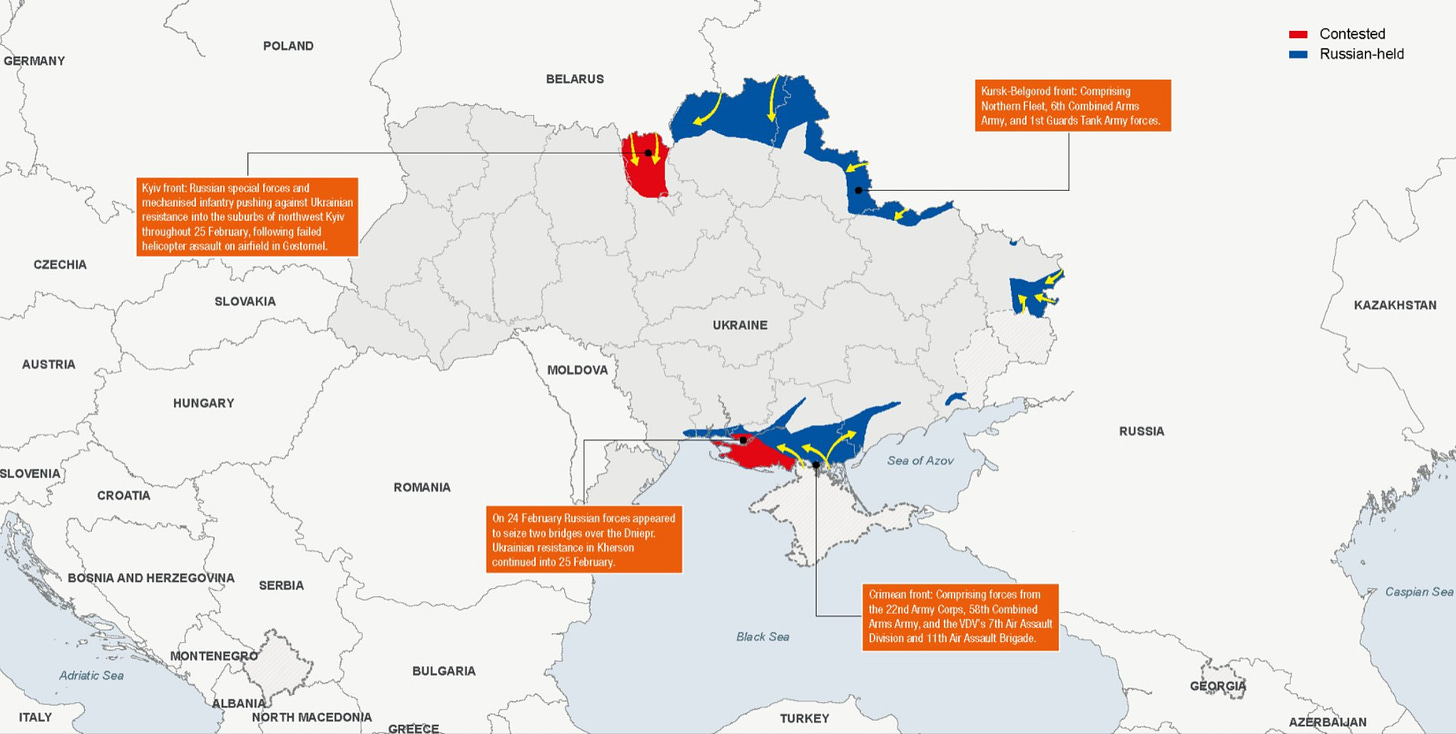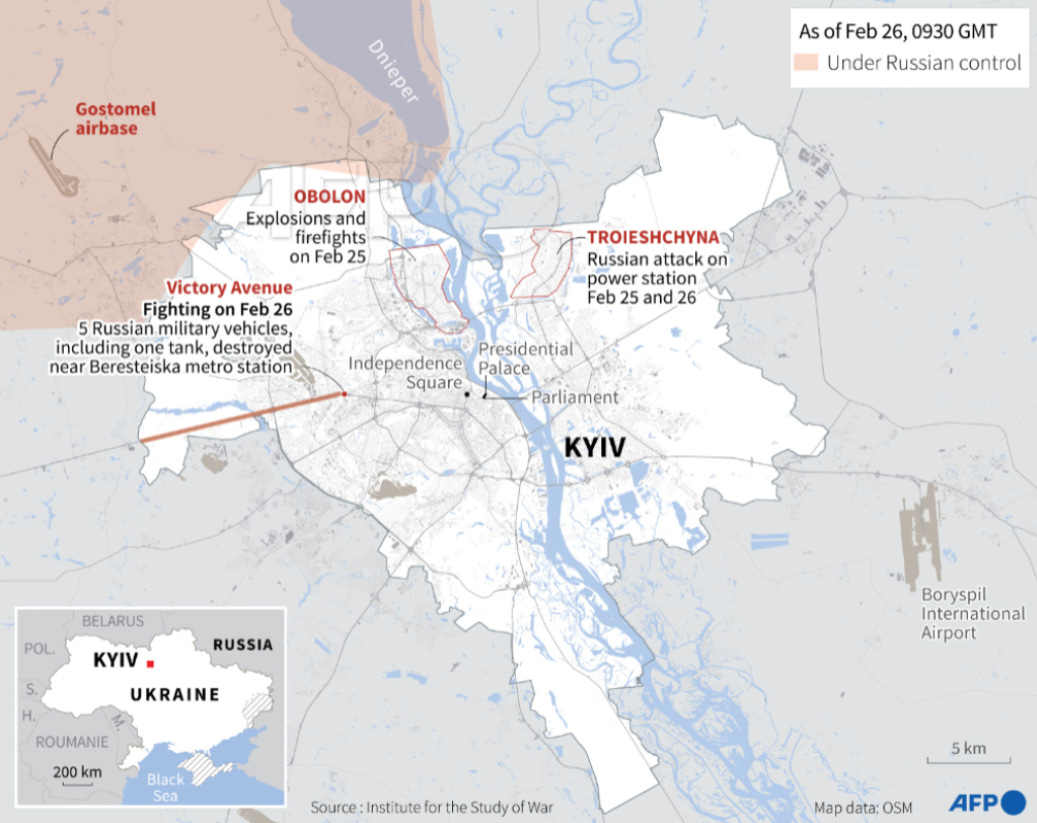In Geopolitics This Week
Russia Initiates Massive Military Operation in Ukraine, Kiev Comes Under Intense Assault as Ukraine Calls for Help, Harsh Sanctions Fall on Russia as Economic War Intensifies
Russia Initiates Massive Military Operation in Ukraine
In the early hours of Thursday morning, Russia launched a massive military operation across the entirety of Ukraine. Artillery and ballistic missile fire targeted key strategic Ukrainian positions while sabotage and cyberattack operations were carried out on infrastructure targets before Russian military units launched spearhead manoeuvres from the North, East and South. These attacks were accompanied by an offensive across the entire line of contact in Eastern Ukraine as airborne units were air-dropped on key strategic facilities. The intended goal of Russia’s operations appears to be enforcing a change of government in Kiev.
Following a series of missile and artillery strikes aimed at disabling Ukrainian airfields, command centres, strategic infrastructure and military facilities, Russian conventional forces commenced a multi-directional ground and air campaign on Ukrainian territory. A likely goal beyond the overthrow of Kiev’s pro-NATO and pro-EU government includes an encirclement of Ukrainian forces in the East while Russian forces move towards the Dnieper River. If the Russian military is able to take control of key industrial centres and manage to cut off Ukrainian forces retreating westward, Russian troops would likely anchor themselves east of the River while the battle over Kiev rages on.
In the South, Russian military units sprang into action and undertook a series of spearhead movements targeting the Ukrainian cities of Odessa, Melitopol and Khersov. Russian forces were quick to take control of a vital canal in Nova Kakhovka in order to restore water supplies to the Crimean Peninsula, with Crimea suffering water shortages after authorities in Kiev blocked the waterway shortly after Russia annexed the Peninsula in 2014. In the East, Russian spearhead movements moved toward the cities of Mariupol and Kharkiv, but have yet to overcome Ukrainian resistance in these areas. In the North, Russian forces have reportedly taken control of the Chernobyl nuclear site after brief fighting with Ukrainian troops, and since then have proceeded to rapidly advance on the capital city of Kiev, where a fierce battle is already taking place.

The extensive Russian use of military forces will have serious repercussions for European security going forward. With diplomatic efforts now abandoned following the cancellation of a potential summit between US President Joe Biden and Russian President Vladimir Putin just a day before Russian military operations began, the use of a wide array of military tools marks a turning point from which it will be difficult to return. Significant military advances have already taken place, with Russian forces making gains against fierce resistance as they continue to push toward key urban and industrial centres in Ukraine. The conflict remains volatile and information on the ground — as in any active warzone — will be difficult to verify as both Ukraine and Russia have a strategic interest in downplaying their own losses and amplifying those of their enemy in a parallel propaganda war.
Kiev Comes Under Intense Assault as Ukraine Calls for Help
Russian troops have advanced on the Ukrainian capital of Kiev as heavy fighting and explosions have been reported in the city. Acts of sabotage, airstrikes and artillery strikes have been accompanied by fierce gun battles throughout the city’s urban landscape as Ukrainian forces arm civilians and attempt to hold their positions long enough for government officials to secure military assistance from abroad. At the same time, diplomatic efforts between Russia and Ukraine to broker any kind of ceasefire have failed, as have diplomatic efforts between Russia and France, and any direct NATO military involvement has already been ruled out.

Nevertheless, unilateral political, economic and military support from many NATO member states is starting to flood into Ukraine. More than two dozen NATO member states, including the US, the UK, and other European countries, have promised to ship more weapons, medical supplies and other forms of military aid to Ukraine.
US President Joe Biden has instructed the US State Department to release an additional $350 million to be immediately used for weapons deliveries to Ukraine. Moreover, the White House has requested that Congress prepare $6.4 billion in new funding, with $3.5 billion intended for the Pentagon and another $2.9 billion to support Eastern European allies. The Polish President has proposed that Ukraine be provided with immediate guarantees of EU membership. The UK government has offered to support logistics operations for the Ukrainian military, with the UK’s Ministry of Defence also reportedly working on establishing an anti-Russian insurgency movement while also laying out plans to support a potential government in exile in the event that Ukraine is overrun.
In addition, NATO has activated its Response Force for the first time in the organization’s history, with parts of the 40,000-strong joint military force being prepared for deployment to NATO’s eastern flank. However, NATO's Secretary General Jens Stoltenberg clarified that this deployment will not be heading to Ukraine, and noted that the move is intended to prevent “any miscalculation, any misunderstanding” about NATO’s willingness to protect its member states. While some of NATO’s member states are intensifying unilateral arms and munitions shipments to Ukraine, NATO itself as an organization appears to not be overtly involved in this process.
Russia seems determined to carry out a change of government in Ukraine, a goal to which the capture of Kiev is paramount. At issue has always been Ukraine’s involvement with NATO, something the ruling Ukrainian elite desperately wants and has worked hard to achieve. However, Russia strongly opposes any NATO involvement in Ukraine, protesting at length over the gradual encroachment of NATO missions that have taken place in Ukraine since 2014. For its part, NATO has often and loudly claimed the “door is open,” yet the military alliance has yet to formally offer membership to Ukraine. As a result, no external power is bound by an obligation to come to the aid of the current government in Ukraine. In a statement which encapsulated this reality, Ukraine’s President Volodymyr Zelenskyy admitted that he does not yet “see anyone” willing to fight on the side of Ukraine.
Read more about this story here.
Harsh Sanctions Fall on Russia as Economic War Intensifies
Over the past three days, the United States and its allies have embarked on a coordinated effort to incur harsh costs on Russia through severe and coordinated sanctions. An intensification of this effort appeared after President Vladimir Putin recognized the independence bids of territories held by separatists in eastern Ukraine, which has now starkly escalated with large-scale military operations across Ukraine’s territory. Following Russia’s large-scale incursion into Ukraine’s territory, leaders in the US, UK and EU are all preparing a series of sanctions targeting almost all sectors of Russia’s economy.
Now, leadership in the US, the UK and the EU are all looking to drastically increase costs for Russia by escalating an ongoing economic war between the two sides. The UK has decided to ban Russian airline Aeroflot, and London was followed in the decision by Estonia, Poland and the Czech Republic as all have now banned Russian airlines from their airspace. The moves have prompted Russia to respond in kind by banning flights from these countries to and from Russia. European Commission President Ursula von der Leyen and French president Emmanuel Macron also announced a set of measures, with both vowing to inflict “maximum impact” on both the Russian economy broadly and its political elite specifically. Moreover, the German Foreign and Economy Ministers said in a joint statement that they are seeking “targeted and functional” ways to exclude Russia from the SWIFT payment system. Other US allies such as Australia, Japan and Taiwan have also made public commitments to participating in the coordinated sanctions regime.
In addition, leadership in the US, the UK and the EU have all made commitments to freeze Russian assets, halt Russian banks’ access to European financial markets, and other sanctions targeting Russia’s interests. This will have wide-ranging economic impacts, with Russia likely to respond by taking actions of its own by intentionally causing turmoil in energy markets. Russian officials have already threatened that Europe should prepare for sky-high gas prices for the foreseeable future, and this area is one where Russia may choose to retaliate. Broad support for barring Russia from the SWIFT payment system could cause the most significant damage to Russia’s economic relationships the world over. The threat of a full economic war means that the agricultural, metals and hydrocarbons markets — all industries where Russia is a considerable player in — are all likely to be highly volatile in the weeks ahead.



